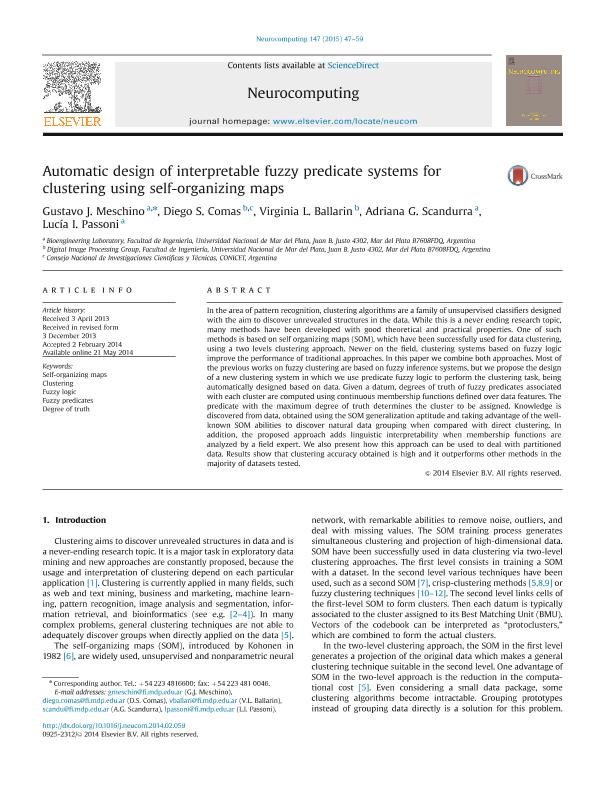Mostrar el registro sencillo del ítem
dc.contributor.author
Meschino, Gustavo Javier

dc.contributor.author
Comas, Diego Sebastián

dc.contributor.author
Ballarin, Virginia Laura

dc.contributor.author
Scandurra, Adriana Gabriela
dc.contributor.author
Passoni, Lucía Isabel

dc.date.available
2018-03-09T20:32:31Z
dc.date.issued
2015-01
dc.identifier.citation
Meschino, Gustavo Javier; Comas, Diego Sebastián; Ballarin, Virginia Laura; Scandurra, Adriana Gabriela; Passoni, Lucía Isabel; Automatic design of interpretable fuzzy predicate systems for clustering using self-organizing maps; Elsevier Science; Neurocomputing; 147; 1; 1-2015; 47-59
dc.identifier.issn
0925-2312
dc.identifier.uri
http://hdl.handle.net/11336/38483
dc.description.abstract
In the area of pattern recognition, clustering algorithms are a family of unsupervised classifiers designed with the aim to discover unrevealed structures in the data. While this is a never ending research topic, many methods have been developed with good theoretical and practical properties. One of such methods is based on self organizing maps (SOM), which have been successfully used for data clustering, using a two levels clustering approach. Newer on the field, clustering systems based on fuzzy logic improve the performance of traditional approaches. In this paper we combine both approaches. Most of the previous works on fuzzy clustering are based on fuzzy inference systems, but we propose the design of a new clustering system in which we use predicate fuzzy logic to perform the clustering task, being automatically designed based on data. Given a datum, degrees of truth of fuzzy predicates associated with each cluster are computed using continuous membership functions defined over data features. The predicate with the maximum degree of truth determines the cluster to be assigned. Knowledge is discovered from data, obtained using the SOM generalization aptitude and taking advantage of the well-known SOM abilities to discover natural data grouping when compared with direct clustering. In addition, the proposed approach adds linguistic interpretability when membership functions are analyzed by a field expert. We also present how this approach can be used to deal with partitioned data. Results show that clustering accuracy obtained is high and it outperforms other methods in the majority of datasets tested.
dc.format
application/pdf
dc.language.iso
eng
dc.publisher
Elsevier Science

dc.rights
info:eu-repo/semantics/openAccess
dc.rights.uri
https://creativecommons.org/licenses/by-nc-sa/2.5/ar/
dc.subject
Clustering
dc.subject
Degree of Truth
dc.subject
Fuzzy Logic
dc.subject
Fuzzy Predicates
dc.subject
Self-Organizing Maps
dc.subject.classification
Ciencias de la Computación

dc.subject.classification
Ciencias de la Computación e Información

dc.subject.classification
CIENCIAS NATURALES Y EXACTAS

dc.title
Automatic design of interpretable fuzzy predicate systems for clustering using self-organizing maps
dc.type
info:eu-repo/semantics/article
dc.type
info:ar-repo/semantics/artículo
dc.type
info:eu-repo/semantics/publishedVersion
dc.date.updated
2018-03-02T14:22:19Z
dc.journal.volume
147
dc.journal.number
1
dc.journal.pagination
47-59
dc.journal.pais
Países Bajos

dc.journal.ciudad
Amsterdam
dc.description.fil
Fil: Meschino, Gustavo Javier. Universidad Nacional de Mar del Plata. Facultad de Ingeniería. Departamento de Ingeniería Eléctrica. Laboratorio de Bioingeniería; Argentina
dc.description.fil
Fil: Comas, Diego Sebastián. Universidad Nacional de Mar del Plata. Facultad de Ingeniería; Argentina. Consejo Nacional de Investigaciones Científicas y Técnicas; Argentina
dc.description.fil
Fil: Ballarin, Virginia Laura. Universidad Nacional de Mar del Plata. Facultad de Ingeniería; Argentina
dc.description.fil
Fil: Scandurra, Adriana Gabriela. Universidad Nacional de Mar del Plata. Facultad de Ingeniería; Argentina
dc.description.fil
Fil: Passoni, Lucía Isabel. Universidad Nacional de Mar del Plata. Facultad de Ingeniería; Argentina
dc.journal.title
Neurocomputing

dc.relation.alternativeid
info:eu-repo/semantics/altIdentifier/url/http://www.sciencedirect.com/science/article/pii/S0925231214005992
dc.relation.alternativeid
info:eu-repo/semantics/altIdentifier/doi/http://dx.doi.org/10.1016/j.neucom.2014.02.059
Archivos asociados
